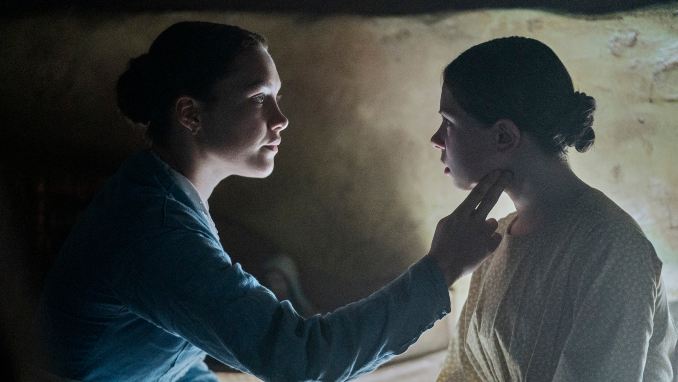The Wonder Winces in Its Investigation of Irish Religious Fervor

The Wonder, the latest from Chilean filmmaker Sebastián Lelio, begins in a far more meta manner than one might expect from a broody period drama. The first thing the viewer sees is the film’s behind-the-scenes conceit, the set plainly assembled from pale sheets of plywood supported by ample scaffolding. Lights, cameras and other requisite equipment lay neatly assembled on the soundstage; the film’s title card appears in the midst of this up-front artifice.
“This is the beginning,” states a faceless narrator (voiced and later embodied by Niamh Algar). “The beginning of a film called The Wonder. The people you are about to meet, the characters, believe in their stories with complete devotion. We are nothing without stories. And so we invite you to believe in this one.”
The camera then pans and moves toward a young English nurse (Florence Pugh), whose occupation and nationality is disclosed via voiceover, alongside the film’s time and place: 1862, England bound for Ireland, the Great Famine (known as the “Potato Famine” to most) only tapering off in the past decade or so. “The Irish hold the English responsible for that devastation,” states the narrator. This piece of information, contextless in the greater history of the brutal famine, instantly presents Pugh’s character as a maligned outsider. As The Wonder marches onward, the narrative championing English intervention among a seemingly savage Irish becomes harder to stomach—particularly if one has a tangible connection to the Celtic culture.
Adapted from Emma Donoghue’s 2016 novel by the author with Lelio and Alice Birch, The Wonder unfolds from nurse Elizabeth “Lib” Wright’s (Pugh) point of view, beckoned to the dead center of Ireland to conduct a fortnight-long “watch” over young Anna O’Donnell (Kíla Lord Cassidy), who claims to have subsisted solely on “manna from heaven” since her 11th birthday four months ago. A staunch agnostic who’s seen first-hand the atrocities of battle while working under Florence Nightingale during the Crimean War, Lib is constantly butting heads with the devoutly Catholic Irish people who’ve summoned her. Lib sees her role as an active investigator as opposed to a bedside companion, searching the cramped quarters of the O’Donnell home for secret food stashes to explain Anna’s impossible fasting feat. When she comes up with nothing, Lib demands that all physical contact between Anna and her family cease. Predictably, the girl’s health rapidly declines after this order. To Lib’s astonishment, the townspeople—including Anna’s family—seem perfectly fine with the prospect of her impending deterioration and death, intent on never revealing the hoax they’ve concocted. “It’s God’s will,” they simply resign as the girl wastes away.
-

-

-

-

-

-

-

-

-

-

-

-

-

-

-

-

-

-

-

-

-

-

-

-

-

-

-

-

-

-

-

-

-

-

-

-

-

-

-

-








































